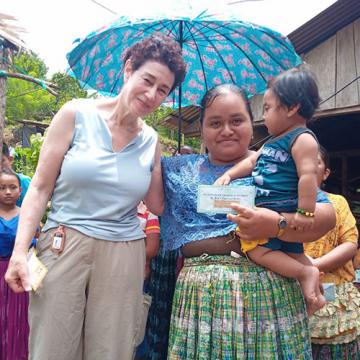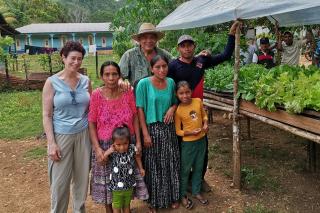Tell me about your non-profit organization.
Our mission at Sowing Opportunities, Inc. is to cultivate self-sustainability, education, and wellness in rural Guatemala, one village at a time. The Indigenous Maya people of Guatemala have experienced genocide for hundreds of years. It is important to preserve their existence and to honor and assist them to prevent extinction. Our non-profit is based in Massachusetts and provides resources to create agricultural infrastructure in several Indigenous remote communities in Guatemala. Our goals are three-fold:
- To set up a system to access water for the village with three milestones, namely water accessibility, water filtration, and water hygiene education
- To set up a greenhouse farming project to teach people how to plant and cultivate their land
- To teach about the benefits of greenhouses and how they contribute to the nutritional wellbeing of their families and economic possibilities of selling their produce.
Our vision is to assist destitute villages in Guatemala in gaining access to clean water for basic needs and cultivation of their land, which will help them to become secure with daily food as well having a livelihood of producing and selling vegetables to the other villages, thereby giving them an opportunity for economic growth.
We embrace five core values to do this work: doing peace and justice work, creating equity, respecting life, empowering one another, and community cultivation.
How did you get involved in this area of work?
The idea of creating Sowing Opportunities began in January 2015, after I had just completed my coursework at Simmons School of Business. Initially, it was just my wife Ginny and me working with friends in Guatemala. Four years before that, our then 6-year-old daughter, who was adopted from Guatemala, had asked about finding her biological mother. I had to wait until I graduated to begin. We started by helping her biological family with food, clean water, and medicine, and then moved on to solutions for the entire village. Water accessibility and potability, emergency food and medicine during the COVID-19 pandemic and recent hurricanes, and now agricultural solutions. We incorporated as a non-profit in 2018.
What does sustainability mean to you?

The people of the extremely remote village of Chajmaic, and two neighboring villages, now have the means to sustainably feed their families, and they have an economy selling sought-after produce in local markets. They have learned sustainable methods, including organic farming techniques, that will sustain them and their families, and which they can replicate season after season, even growing foods they previously had no knowledge of, such as potatoes.
Sustainability includes the health of the entire community, and we have begun to measure that. One goal is to ensure that metrics include childhood nutrition and growth, and we are seeking connection with an organization to assist with health metrics and then we will provide basic training.
Historically, small groups of young men in the village had relied on traveling outside of the region for months to work on large palm tree plantations, fishing, and taking in other people's laundry. They are now requesting that we help them with greater water accessibility to help them to water their greenhouses more effectively, and we intend to include filtration into this project.
Doing the work to help people stay in their own communities is valuable, and the greenhouses can withstand the effects of climate change. This helps prevent malnutrition and hunger. It gives people a reason not to leave their communities and to risk dangerous, undocumented immigration. We give them support so they don't have to risk their lives to leave their country.
How did Simmons prepare you for this opportunity?
I still draw knowledge from what I learned at Simmons, including leading individuals and groups, negotiation and problem solving, culturally intelligent leadership, technology and operations management, and an independent study in health economics, focused on Guatemala.
What do you find most rewarding about your work?
We are doing what is known in Judaism as tikkun olam, or repairing the world. Seeing the smiles on the faces of the families who are participating in the project is amazing. We go to local farmers' markets and fairs to raise funds as well as rely on generous donations. We are seeking a partnership so that we can initiate a capital campaign to acquire a plot of land away from the river on high ground and construct a multi-purpose building and also begin our water potability project.

